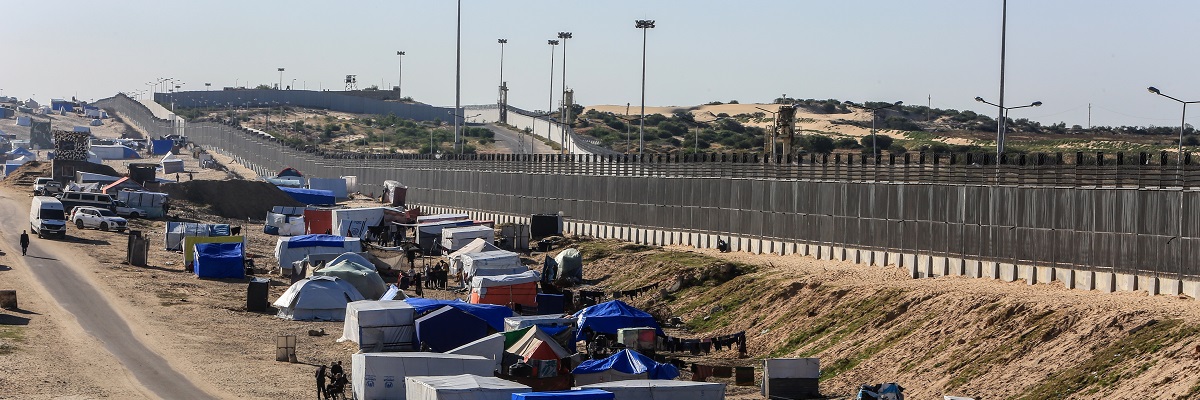Defense & Security
Rafah, between ceasefire announcements and the resumption of fighting: Israel’s strategic dilemma.

Image Source : Shutterstock
Subscribe to our weekly newsletters for free
If you want to subscribe to World & New World Newsletter, please enter
your e-mail
Defense & Security

Image Source : Shutterstock
First Published in: May.07,2024
Jun.17, 2024
In the last 48 hours, a series of events and situations have significantly contributed to redefining the military and diplomatic scenario in Gaza. It all began on the night of May 5, when Hamas launched several rockets that hit Israel, causing some civilian casualties. At the same time, the Israeli Defense Forces (IDF) responded to the act with massive artillery bombardments against several Hamas positions in the al-Zahraa, al-Mughraqa, and Nuseirat camps (in the central-northern areas of the Gaza Strip) and took control of the Kerem Shalom crossing, which separates the enclave from Israeli territory. However, the IDF's actions went further with the announcement on May 6 of the expansion of the humanitarian area of al-Mawasi (in the coastal south of the Strip). This choice seems to be driven by the political will to regain control of the southern strip of Palestinian territory through the forced evacuation of Palestinian refugees from Rafah and Khan Younis towards al-Mawasi (where it is estimated that over 100,000 people will arrive shortly), also guaranteed by the Israeli resumption of the Gaza side of the Rafah crossing. All these actions seem to suggest a green light from the war cabinet for the launch of the repeatedly announced Israeli ground operation in the area. Simultaneously with the war preparations, just a few hours later, came the unexpected announcement from Hamas that it had accepted a proposal for a ceasefire in Gaza. The terms of the ceasefire – admittedly still very unclear given the often-unreliable media reports – were reportedly mediated by Egypt and Qatar, with U.S. approval, which reportedly infuriated representatives of Tel Aviv. Based on the details announced by Hamas officials, the proposal is expected to outline a three-phase plan. The first phase involves a 42-day ceasefire period during which Hamas would release 33 hostages in exchange for the release of some Palestinian militants detained in Israeli prisons. In the second phase, Tel Aviv would partially withdraw its troops from Gaza and allow the free movement of Palestinians from the south to the north of the Strip. After this preliminary phase, another 42-day period would be activated only if it clearly emerged that both parties were willing to restore a climate of "sustainable calm" in Gaza, which would also favor the complete withdrawal of Israeli troops from the area and the final release of the reservists and IDF soldiers held by Hamas. To crown this prolonged "silence of arms," the final step would be reached: the establishment of a true ceasefire and the start, among other things, of a reconstruction phase, including the end of the total Israeli blockade of the Gaza Strip, according to a plan supervised and shared by Qatar, Egypt, the USA, and the United Nations. Based on leaks and fragmented information, it is very difficult to make precise assessments, but it is plausible to imagine that if the terms of the agreement were as presented here, it would be very difficult – almost impossible – for Israel to accept the Egyptian-Qatari proposal. It would be much more satisfying for their expectations to continue with a military operation in Rafah. In the preceding days, the Israeli war cabinet had also explained the necessity of maintaining its action in Gaza unchanged, with or without an agreement with Hamas, as it was fundamental and strategic to achieve its primary objective: the destruction and eradication of the Islamist organization from the Palestinian enclave. Given this evidence, both the nature and complete terms of the diplomatic proposal accepted by Hamas, as well as the Israeli willingness to follow through on the agreement, are fundamental to creating a positive development in the current dynamics. However, no actor (regional or international) involved in the negotiations is under the illusion that a turning point has been reached, given both the opposing positions of the contenders and the operation in Rafah, which is now about to enter the heart of the action. This latter element is crucial to understanding the behavior and calculated risk taken by Hamas. In fact, at least until late afternoon on May 6, the organization had shown no interest in the Egyptian-Qatari proposal. The change of pace would suggest that the Islamist organization may have wanted to take advantage of the situation to put the ball back in the opponent's court, shifting all responsibility to Israel in the event of its refusal to follow through with the ceasefire, preferring instead military action in Rafah. In this regard, it could be argued that Hamas's twist of events was as clever as it was politically significant in contributing to weakening Tel Aviv's position. Not surprisingly, the movement led by Ismail Haniyeh understands that Israeli mediators cannot accept any negotiation that involves the withdrawal of Israeli troops from Gaza, the end of the total blockade of the enclave's borders, but above all, the continuation in power of the organization towards, which Benjamin Netanyahu himself has declared, their destruction as an undeniable objective. A position that, regardless of whether Israel accepts the agreement already approved by Hamas in whole or in part, as well as its rejection, would expose Israel to a difficult condition of internal contention and to some strategic considerations that the Islamist movement knows well and has already exploited precisely to launch that tremendous attack on the heart of the country on October 7, 2023. In the perspective of Tel Aviv, the acceptance or rejection of the proposal by Egypt and Qatar, as well as the start of the operation in Rafah, raise a series of questions on multiple fronts, in which Netanyahu plays his usual game of political survival. If his government were to follow through with the agreement and stop/postpone the operation in Rafah, it would undoubtedly benefit diplomatically, enjoying a resurgence of credit after the storms of recent months. However, this would also mean opening an internal front, especially within his government, with extremist ministers threatening the fall of the executive. Itamar Ben Gvir and Bezalel Smotrich have clearly stated that without the destruction of Hamas and the conquest of Rafah (and the entire Strip), the government would have no reason to exist. At the same time, even more moderate figures in the war cabinet, such as Defense Minister Yoav Gallant or Ministers Benny Gantz and Gady Eisenkot, have not taken a clear position, wavering between the possibility of a more contained humanitarian ceasefire and the wavering political opportunism on the military operation in Rafah in a challenge that seems more oriented towards the country's future and the conquest of the conservative electorate and the national right, the current Prime Minister's target audience. However, it is equally true that even in the face of a rejection of the international proposal, some clear repercussions would emerge: Israel would worsen its position and reputation, although it could keep that government in place that is now pushing relentlessly on Rafah. Such a situation would not avoid, either, domestic social protests by the families of the hostages, who demand guarantees from the government not to endanger the lives of their loved ones. In both cases, Tel Aviv would be called into question and would risk losing internal and external credibility, along with the political and security dilemma (mainly supported by the military establishment) linked to the failure to eradicate Hamas. Such a fluid and unpredictable scenario with potential repercussions even on different levels of the regional and international context. In fact, a resumption of hostilities in Rafah would have the opportunity to activate the Lebanese scenario in a different way than what has happened so far (where violent exchanges of fire have been occurring along the Blue Line border areas for days) and lead to a worsening of security conditions in the West Bank (especially in the triangle between Tulkarem-Nablus-Jenin, where IDF raids have become more pressing). A similar situation could open the door to external actions by other actors interested in instability, such as Iran, which would benefit from the role played by its proxies in Syria and Iraq, as well as the potential and renewed threat from the Yemeni Houthi militias to exert pressure on Israel, but also on other regional players involved in the ongoing dynamics - the thought in these cases essentially revolves around Egypt, Jordan, and Saudi Arabia, which for different reasons have so much, and perhaps even too much, to lose from an escalation of the Gaza scenario. No less decisive must be considered the international impact of Tel Aviv's rejection of the Egyptian-Qatari proposal, especially considering how the United States has been engaged in recent weeks in trying to convince its ally to reconsider its positions on Iran and advocate for particular attention to the humanitarian situation in Gaza. In this sense, Washington has clearly expressed its warning to its ally about the risks associated with a possible miscalculation that could open up various considerations. Not surprisingly, the White House can always leverage the issue of military supplies as a tool of pressure. Just last week, the United States suspended a shipment of ammunition to Israel without providing details on the reasons. It could have been a simple bureaucratic error or a signal, but it's evident that considering such a scenario would provide new space and considerations for both internal and external detractors of the Biden Administration. Conversely, such a development could give new impetus to Israeli Prime Minister Netanyahu, who has never hidden his strained relationship with almost all US administrations he has collaborated with during his 15 years in office. With the sole exception of the Trump Administration, which in the post-election American context could see the New York tycoon returning as the new occupant of the White House and Israel's key partner in the Middle East. Therefore, the assessments remain complex and highly susceptible to changes due to the volatility of the local scenario. However, it is undeniable that from this initiative, Israel has much to lose, and the concrete risk is that Hamas has carefully assessed this "trap" with the intention of further weakening Tel Aviv. License under Creative Commons Attribution – ShareAlike 3.0 Unported (CC BY-SA 3.0).
First published in :

Giuseppe Dentice is Ph.D in “Institutions and Politics” at the Catholic University of the Sacred Heart in Milan (2020). He is also Teaching Assistant in “History of Civilizations and Political Cultures” and “International History: The Wider Mediterranean area” at the Catholic University of the Sacred Heart in Milan, respectively since 2019 and 2020. He is the head of the Middle East and North Africa Desk at the CeSI - Center for International Studies. His research interests apply on international relations of the Middle East and geopolitical and security issues in the MENA region, with a special focus on socio-political transformations and governance in Egypt, Israel, and Gulf monarchies. He published extensively – in Italy and abroad – on a wide range of issues regarding the MENA region and international politics. He is also regularly interviewed on Middle East affairs by Italian and international media outlets.
Unlock articles by signing up or logging in.
Become a member for unrestricted reading!